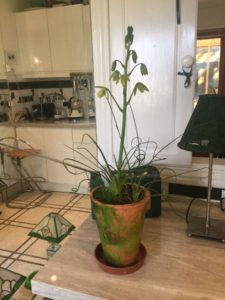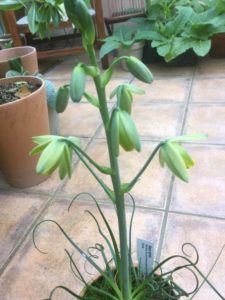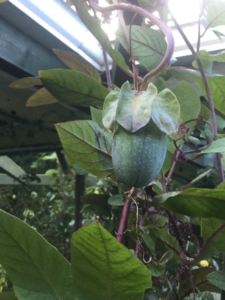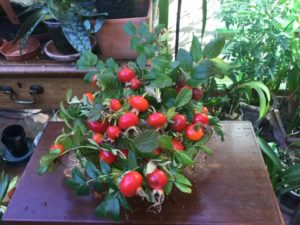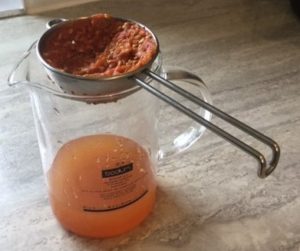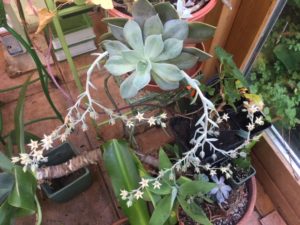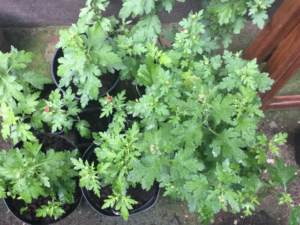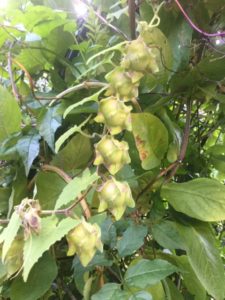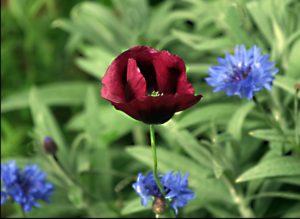November in our Gardens by Philippa Thomas.
Our evenings really do draw in over the first two weeks of November and the last of our hardy late summer flowering plants fade away. We can still occasionally see some beautiful clear blue mornings, some wonderful foggy evenings and then, the most picturesque scenes of frosty landscapes. Here over the past 7 months, we have witnessed the depths and then the highs of our beautiful Dalkey. We are missing family, our friends, dinner parties, garden club meetings, pop-in suppers etc. We have all had to make do with latterly sitting outside at a social distance with neighbours etc. The worst conditions can bring out the best in us. The opposite of depression is expression. Your garden might be tiny but it’s what is in it that counts. Your plants are the lungs of your soil and garden. Home isn’t where you’re from, it’s where you find light when all goes dark and you know, some everyday plants can benefit our health with their healing properties. Preparation for our winter is top priority now: we can seize the briefest moment of clement weather to stay on top of our essential tasks. A cosy hat/beret and pre-warmed thick woolly socks entice, big time. This slowing of pace and the confinement to a smaller world, our lockdown has forced us to spend so much more time in our loved family space. Our Dalkey gardens are our sheltered havens. Again, this lockdown has especially forced us to adapt to some modern alternatives. We can photograph our plants and flowers and up comes its name and a good deal of information and its history. Really, hasn’t it made forest walks so much more interesting as well as solving the mystery of an unusual herb or the likes. We can access birds, birdsong, butterflies, moths etc with apps, – they are all at our rescue! Our recent clean air too, has transformed our night sky and given clarity especially for city people. Again, apps tell us the names of stars and then, constellations have come into their own. Perhaps, we might now have a deeper appreciation of what lies around us in this wonderful world which might spur us to protect and enhance it.
- Love This Albuca so much, find myself going out to the kitchen to admire it…..!
- Albuca Spiralis, Frizzle Sizzler, Purchased On Our Very Last Trip To The UK, In June 2019. A Scented Bulb With Distinctive Corkscrew Foliage……I have been living to see my beauty flower and here it is, in late October ! Adore everything about It…..
POTTED PERFECTION.
Now, is bulb moment, the choice out there is phenomenal. You can plant in almost anything as long as it has drainage holes. A cluster of pots can create such an eye catching showstopper. We can go for whopping, big bold and brilliant or for quietly stylish swaths of pale pastel shades, we can accent our borders, go all out. ….. A large terracotta pot, perfect for bulb lasagne or big planting combos or perhaps again, small and sensational. Maybe, let’s grow a stunning arrangement on a table outside a glass window so that we can enjoy inside, likewise we can liven up our doorstep. Best to plant tulip bulbs later than everything else to prevent the risk of tulip blight. Tulips really deliver that pop up factor of colour. Tulips prefer sun over shade and thrive in a spot that hasn’t had tulips growing in it for years. They love new fresh soil which of course means, they really do well in pots. Ultimately, all we need again is good potting soil, ample nutrients and sufficient drainage. Maybe then, place in a spot that catches the late afternoon sun.
- I Was Thrilled To See This Seed Pod On Our Cup And Saucer Climber, Cobea Scandens, This Morning…
ROSE HIPS, HIP HIP HOORAY.
Some roses produce fantastic hips. Rose hips are a valuable source of food for birds and other wildlife. For others, they are a very good source of Vitamin C and can be made into jams, jellies and teas. Hips vary hugely in size, shape and colour. Hips can be rounded, oval, elongated, pear or flagon shaped. Some are smooth, some are hairy and some quite bristly. They can be red, orange, varying shades from yellow to mahogany brown or black and some are bicoloured. Perhaps, the best known of roses for hips is Rosa Rugosa. Its very large tomato-like, orange-red hips ripen quickly by July/August. These are generally followed by a 2nd crop of flowers and hips, – what value. It is completely disease resistant, alkaline, winter hardy and can also cope with very poor soil. ‘Morning Mist’ is similar although the flowers are a salmon pink, it’s very large hips lasting right through the winter. Good air circulation is so important for container grown and adequate light to avoid disease problems.
- Rose Hips, All Ready For Simmering Slowly For A Few Hours.
- Juice Of Rose Hips, Packed With Vitamin C
“It Seems To Me That The Natural World Is The Greatest Source Of Excitement, The Greatest Source Of Visual Beauty, The Greatest Source of Intellectual Interest. It Is The Greatest Source of So Much Life That Makes Life Worth Living”.
Sir David Attenborough
“There Are Some Million Different Kinds Of Animals And Plants ln The World. Four Million Different Solutions To The Problems Of Staying Alive”.
Sir David Attenborough
- Hacked this succulent back hard, earlier this summer and because it looked so sad, left it out in the garden….This is its first time flowering ever….
- I bought this double rust rose like, Chrysanthemum at our plant table, just before Covid….I took a chance and divided it….., now have 8 potential heart warming delights.
MIGHT DO, MAYBE NOVEMBER JOBS.
Lovely flowers to pick and arrange from our gardens, for our kitchen tables. Chinese lanterns, seed heads of agapanthus, (beautiful sprayed in copper or gold,) scabious, nerines, grasses, rosemary, sage, rhamnus, spindle, schizostylis,/river lily, the last of the dahlias, chrysanthemums, the latter are presently like real princesses dancing in their ball gowns to autumn music in the wind. Perhaps, add a slosh of vinegar to keep bacteria at bay.
If choosing hydrangeas, try to choose ones that are not damaged by rain. Float the flowers in a bath of cool water, then, arrange them in a vase with only an inch or two of water. As this evaporates, the flower heads will dry and keep their colour. A drop of glycerine will help them retain their texture.
- Established peonies are best pruned now, shortly after our first frosts, we can plant new divisions as well.
- Raise any patio containers by adding bricks or feet underneath, this will protect plants and soil from becoming waterlogged during winter rain.
- Maybe, remove dahlia tubers from the ground, leave somewhere warm and dry for a couple of days, then store in dry compost or sitting in newspapers or in a pot indoors and save till spring.
- If you store small squashes and pumpkins inside for about a month, they will dry out well. You can varnish their skins, (I use yacht varnish,) pile them into a bowl for a still life arrangement that will last through the winter.
- Hardwood cuttings can be taken in November and believe it or not, you can start sowing sweet peas undercover, for next year.
- Chilli flakes scattered densely over the compost surface of a pot will help deter squirrels, rats and mice.
- How about using an old dustbin lid, turned upside down on a plant pot as a bird bath.
- Maybe, let’s put some lights and place a candle in a safe place outside and enjoy some precious time in our winter magical gardens.
- Remember, birds will be trying to fatten up for the winter to ensure a reserve to survive the frostiest of nights.
- Seeds Of Asarina Scandens Now Called, Mauranda Scandens….Bought this snapdragon seedling climber, 2 years ago at our plant table…., was so surprised when it over wintered.
- I posted as a surprise to Pamela Aitken, some Papaver Somniferum Lauren’s Grape Poppy seeds which I bought at our rare plant talk, sales table…..This beauty, was one of those seeds. Very Well Done, Pamela….

